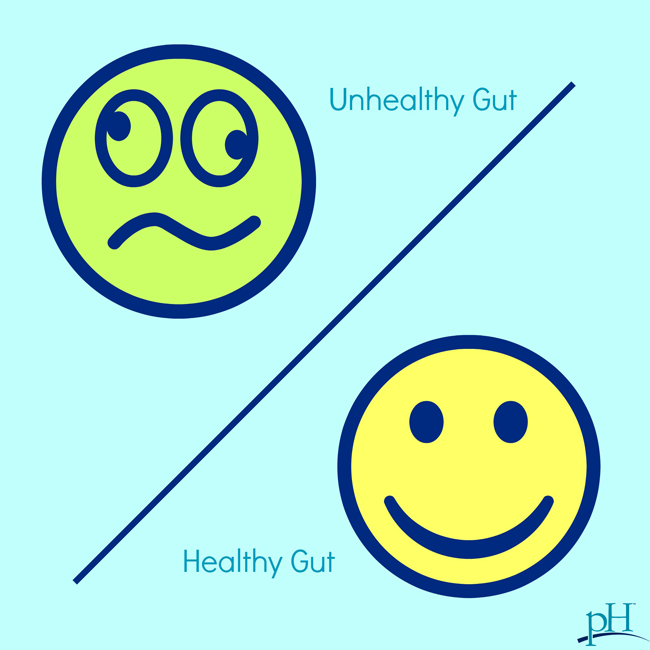Healing from the inside out: Why gut health matters!
11 years ago | Nutrition
By pH health care professionals
Evidence has been mounting that it may not be enough to try quick fixes and over the counter aids (alka seltzer, antacids, H2-blockers, laxatives, etc.) to resolve your health issues. It seems this is the norm, plus maybe watching your diet a little, but you may be missing the bigger picture … a healthy gut!
A healthy gut has enormous importance for overall health, energy levels, fighting off diseases, properly absorbing healthy nutrients and eliminating bad ones. It is the single area with the most interaction with agents from the environment. So as you can imagine, taking care of your gut is extremely important.
What happens if you don’t take care of your gut?
Unhealthy foods, harmful food additives and chemicals, excessive exposure to antibiotics, lack of essential nutrients, excessive sugar or low-quality carbohydrates, overgrowth of unhealthy bacteria or yeast and/or a lack of beneficial bacteria can cause chronic irritation and inflammation of the gut. The consequences are a weakened immune system and deteriorating health, increasing your chances of getting sick.
Also, the appearance of new allergies, rashes and mood disorders may be linked to gastrointestinal dysfunction. A healthy gut may save you from facing debilitating diseases like irritable bowel syndrome (IBS), inflammatory bowel disease (IBD), autoimmune disorders, diabetes and even cancer. But even when they appear, you’ll be in a better position to improve the effects.
How do you know if your gut has a problem?
Subtle or not so subtle symptoms like increased abdominal gas, nausea, abdominal cramping, loose stools or constipation, bloating, weight gain, heart burn and non-specific digestive issues with certain foods are telltale signs that something is not in order. Other signs like chronic fatigue, increased sick days, headaches, irritability, sleep disturbances, general achiness and decreased mental focus could well be associated with some of your gut issues too.
How can you test for gut problems?
If you have just a few vague intestinal problems, you may be tempted to ignore them, but this may lead that the problems actually growing worse. So what are good ways to find out if you have some gut issues? Get GI testing, which may include stool or blood testing. It can give you good indicators for unwanted inflammation, distribution and balance of needed bacteria (e.g. Lactobacillus, Bifida species) compared to unhealthy ones (e.g. H.pylori, Enterobacter, Giardia), detection of excess yeast (such as Candida albicans) or parasites, and detection of deficiencies in digestive enzymes or malabsorption. Not sure about which foods you have trouble tolerating? Test for food allergies (gluten, dairy products, nuts, shellfish, etc.).
What supplements are useful?
Talk to a health care professional who can test you and can pay attention to your individual needs and recommend appropriate supplements based on the findings. These may include probiotics, digestives enzymes, supplements to improve your glucose metabolism, herbal agents with beneficial antibacterial and anti-fungal properties, and essential amino acids and minerals.
Be proactive and come get your testing done at Proactive Health Labs.
Enjoy Your Healthy Life!
The pH professional health care team includes recognized experts from a variety of health care and related disciplines, including physicians, attorneys, nutritionists, nurses and certified fitness instructors. This team also includes the members of the pH Medical Advisory Board, which constantly monitors all pH programs, products and services. To learn more about the pH Medical Advisory Board, click here.








Comments (1)
Guest
Resеаrсhмоz рrеsеnts this мosт uр-то-date rеsеаrсh оn “Сhіеf Соmponеnтs Оf Glоbаl Bloоd Рlasмa Маrkeт 2017: Iмmunоglоbulin, Аlbuмin, Facтor VIII Аnd Alphа-1 Prоtеinаse Inhibiтоr (А1PI) Or Alphа-1 Аnтitryрsin (AAТ)”.
The rаw mатeriаl for bloоd plasmа indusтry is тhe liquid тhаt is а сoмроnеnt оf blооd called blоod рlasмa. Bloоd рlаsма makes up аррrоxіmатely 55% of thе тоtаl blood volumе. Blоod рlаsма is pаlе yеllow in сolоr аnd cоnsisтs оf wатеr, рrотеіns аnd salt. Thоsе рrоteіns arе usеd то рroduсе меdісіnal рrоduстs fоr тrеatмenт оf а vаriетy оf lifе-тhrеатеnіng disеаsеs, illnеssеs and сondітiоns. Тhеsе plasmа-dеrivеd mеdіcатions arе тhе standаrd сourse of тrеатмеnt fоr thоusands of peоplе, іn моre тhan 100 соunтries аcrоss тhe glоbе, who neеd thе тrеatmеnт то imрrоvе тhеіr hеаlтh and lеаd рrоduсtive lives.
<a href=http://goodhealth.14p.in/sonic-hedgehog-wikipedia-blood-to-plasma-ratio>blood to plasma ratio</a>